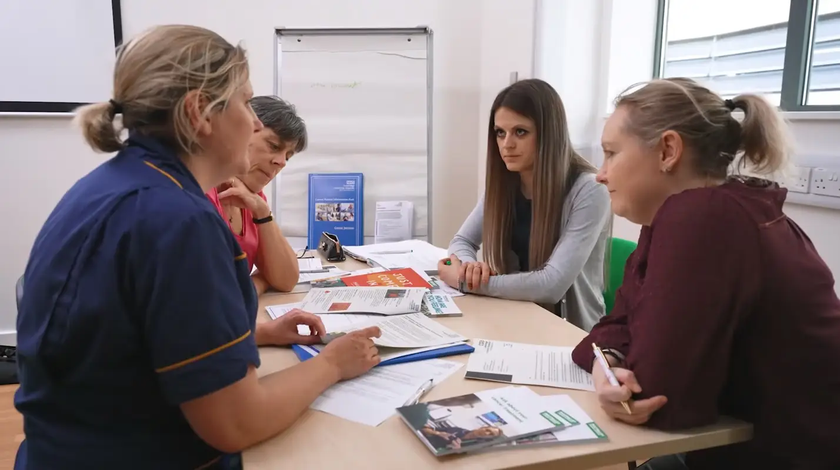Cancer Services are committed to involving patients from the very beginning and ensuring their voices are heard. We aim for patients and staff to work together to improve services and outcomes for cancer patients.
This involvement means empowering people to identify the right questions that need to be asked, rather than simply commenting on decisions that have already been made. It’s about sharing power between those who use and those who deliver the service, ensuring that skills and resources are applied effectively and are embedded throughout the whole service.

What is co-production?
Co-Production: Patients and Staff Working Together to Improve Cancer Services
Link: https://www.youtube.com/watch?v=PsqFA-PqiPw
Co-production is a way of working that involves people who use health and care services, carers and communities in equal partnership; and which engages groups of people at the earliest stages of service design, development and evaluation. Co- production acknowledges that people with ‘lived experience’ of a particular condition or healthcare pathway are often best placed to advise on what support and services will make a positive difference to their lives.
Coalition for Personalised Care
Co-production is a way of patients and clinicians to work together to improve care by acknowledging and using patients’ experiences to help inform service provision. It validates the lived experience by using the skills and valuing the assets of people who have experienced cancer firsthand. It ensures that patients, their carers, and their families have a say and feel acknowledged and empowered during and after any cancer treatment. It provides the opportunity for patients to be more equally involved in decisions that affect them - nothing about patients without patients.
Co-production also means patients and clinicians working openly together to deliver cancer care improvements by identifying needs and helping to find solutions. Through participation in projects and strategies, patients contribute to positive change at many levels.
Co-production is an equal partnership between patients and clinicians, from addressing an issue to project design and delivery. It is about involving patients in the design of services and facilities - not just sometimes, but all of the time.
What we have found is that co-production isn’t easy, but when it works, it brings real benefits for both patients and staff. Co-production gives us confidence that our service offer is based on what our patients actually want and is co-designed and delivered with them.

Success stories of working in co-production with patients
- Campaigning for clinic letters to be written from clinicians directly to patients, with copies to GPs
- Contributing to the redesign of the Oncology Outpatients Department
- Contributing to the development of a new finger-prick test for patients to detect the possibility of neutropenic sepsis
- Designing and updating the contents of information packs for new cancer patients
- Co-designing and contributing to the Cancer Service webpages on the CUH Website
- Co-designing the content and starring in the Welcome to Cancer information videos which can be found on the CUH cancer webpages
Patient co-production opportunities
East of England Radiotherapy Network Patient Co-Production Volunteer Group
Help shape the future of radiotherapy services by sharing your personal experiences of radiotherapy. By taking part, you can:
- Influence how current and future services are designed and improved
- Ensure that patient and carer voices are at the heart of the work delivered by the East of England Radiotherapy Network
You do not need to have any skills or experience, other than having used radiotherapy services. All meetings are held online and via email.
Would you like to find out more about this group, or let us know if any adjustments would help you get involved? Please Email Alison Bowman.
Cambridge Cancer Research Hospital (CCRH) Patient Advisory Group (PAG)
The Patient Advisory Group (PAG) offers a way to get involved in the Cambridge Cancer Research Hospital (CCRH) project. If you are interested, or have experience that could be beneficial to one of our workstreams, which include workforce and
transition planning, as well as sub-working groups covering inpatients, outpatients, day case and administrative spaces – please get in touch by emailing CCRH.
CCRH website (opens in a new tab)
Cancer Research UK
The Cancer Research UK Cambridge Centre is a partnership between the University of Cambridge, Cambridge University Hospitals NHS Foundation Trust and Cancer Research UK. If you are aged 16 or over and are interested in contributing to CRUK’s vital work, please complete the form via the link below to register your interest.
CRUK - Join our Patient and Public Involvement Groups (opens in a new tab)
East of England Cancer Alliance
This group is made up of local people who have experience of cancer, either their own or through friends and family members. They meet virtually once a month, with occasional face-to-face meetings through the year. Patients and former patients listen to educational talks by various experts, share their views and experiences, and provide valuable perspectives to help shape cancer services.
Get involved: East of England Cancer Alliance (opens in a new tab)

